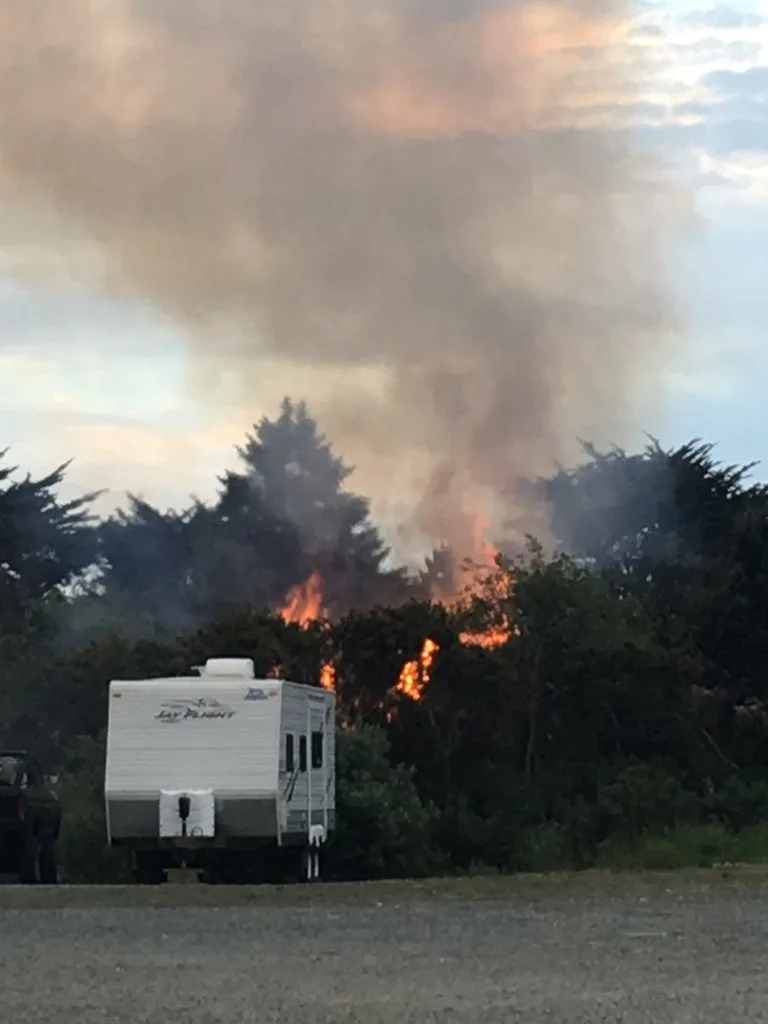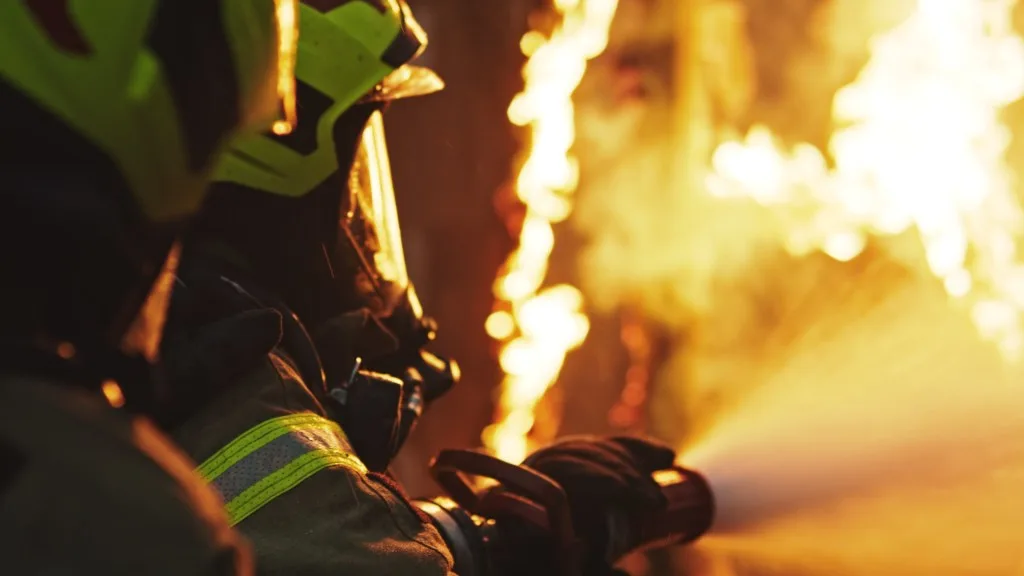If you want your campfire to be the only flame at your campsite, you need to fireproof your RV.
It’s easy to get caught up in enjoying your time and camping adventures that you may overlook how dangerous a situation could be. But one little mistake, and your camper and future camping plans could go up in smoke in seconds.
Today, we’ll share a few common causes of RV fires and tips for protecting your rig.
Let’s dive in!
How Common are RV Fires?
Unfortunately, camper fires are much more common than you think. Data from the National Fire Protection Association indicates that approximately 1,900 camper fires occur each year, and 20 deaths occur as a result.
With the massive increase in RVing in recent years, this number could grow drastically in the coming years. Don’t let your rig be one of them!
These fires are incredibly dangerous because they typically consume the entire rig and burn it to the ground. In addition, if they occur in a campground or RV park, there’s a good chance they can spread to vegetation or damage neighboring campers.
How Long Does It Take an RV to Burn Down?
Every second counts if a fire breaks out. The entire camper can burn to the ground in approximately ten minutes. The burn happens quickly because manufacturers often use lightweight materials that also are highly flammable.
Fires that erupt in an RV can quickly spread through the flammable materials and any fuel sources it finds inside. Flames gobble up clothes, curtains, and bedding as they rip through the motorhome. If you need a reason to declutter your rig and get rid of stuff, now you have one!

What Are the Common Causes of RV Fires?
When camper fires occur, there’s typically a handful of reasons for them. If you want to fireproof your RV, here are a few areas and activities to consider.
Cooking
The kitchen is one of the most common places for fires in a camper. This is because these kitchens are substantially smaller than residential kitchens. While you can prepare just about any food in them, you have a fraction of the space.
Because space in an RV kitchen is limited, it’s very easy to set down rags or for flammable items to get too close to the stove. In addition, most campers use propane for their stove tops, which means there will likely be an open flame while you’re cooking. If you happen to set something too close, it will not take long before it is ablaze.
Loose Electrical Connections
Another common cause of RV fires is loose or faulty electrical connections. You don’t have to own a camper long before you realize that sometimes the craftsmanship can be somewhat inconsistent. But it becomes a concern if it involves your wiring. If it’s not done right, they can come loose over time from bumps in the road.
In addition, you also have to consider that mice and other rodents can cause issues. These pests typically aren’t picky about what they eat for a snack, so they might munch on the wiring in your RV. This creates a fire risk and can cause expensive damage to some of your electronics.
Leaking Fluids
For drivable RVs, fluids in the engine and other essential components can get incredibly hot as they rocket your rig down the road. Leaks in the engine compartment can quickly cause a fire to erupt in the engine compartment. You may overlook an issue until it’s too late.
Not that other fires aren’t incredibly dangerous, but these fires are one of the scariest. This is because you’ll need to quickly find a safe place to pull over if you’re traveling down the highway. If navigating a large rig wasn’t hard enough, try doing it while it’s on fire.
Overheating Tires or Brakes
You don’t have to be a professional mechanic to know that your tires and brakes play an important role. However, these important items can become incredibly dangerous under certain circumstances. They can generate tremendous heat and ignite a fire for your rig.
Low tire pressure is one of the biggest reasons for tires to overheat. Not having enough air increases the friction between the rubber and the road. The longer and faster you travel on them, the hotter they get. This causes the materials to break down and can lead to a blowout or fire.
Overheated brakes can also cause an increased risk of an RV fire. This typically occurs when a driver relies too heavily on their brakes in a short period. It’s one of the reasons to ensure you have the right tow vehicle for your rig. Trucks with exhaust brakes reduce your reliance on brake pads when navigating extended declines in the grade of the road.
Overloading Electrical Outlets
The electrical outlets in an RV are similar to those in a typical home, but they can only handle so much. It can be easy to underestimate how much power some devices require and push your capacity to the limit. However, this can quickly cause an unsafe situation as the wiring may not be able to handle the loads.
Appliances like space heaters, coffee makers, air fryers, and pressure cookers use a tremendous amount of power. You can short the outlets and possibly start a fire if you’re not careful.
Pro Tip: Make sure you know these 5 Ways Your Camper Can Catch on Fire before you hit the road.

Tips for Fireproofing Your RV
If you want to keep your RV safe, there are a handful of things you should do to fireproof it. While you can’t eliminate the risk of a fire from occurring, you can tip the odds a bit more in your favor.
Cook Outside When Possible
As we mentioned, kitchens in campers can be incredibly tiny, and workspace can come at a premium. You can keep the flames and fire risks out of your rig by cooking outdoors. You don’t have to worry about accidentally starting a fire inside your rig while making a delicious meal.
Y you also can keep the heat generated while cooking out of your rig, which can help you stay cool in the summer. Many RVers invest in propane griddles for this very purpose. Blackstone grills are incredibly trendy in the nomad community and can help keep you and your camper safe.
Check Your Tires and Use a TPMS
Checking your tire pressure critical before hitting the road for any trip. Many people carry portable compressors in their camper to fill up as needed during their adventures. You should never drive without the right amount of air.
In addition to checking your tire pressure, a monitoring system is a must-have item for RVers. These devices track the air in your wheels and can alert you should the temperature or pressure reach unsafe conditions. This can help you avoid a potentially dangerous situation while traveling.
Have Multiple Fire Extinguishers in your RV
If a fire does ignite in your RV, you need to be able to put it out as quickly as possible. If you’re buying a trailer, there’s a good chance it will come with at least one fire extinguisher. However, these aren’t always stored in the most convenient locations. We recommend purchasing additional suppressors to store around your RV.
An extinguisher in your vehicle, outside storage compartments, and outdoor kitchens can be incredibly helpful. If a fire occurs in or around your rig, you’ll be able to put it out before it becomes a much bigger situation.
Keep Up with Routine Maintenance
It can be easy to get caught up in enjoying your RV and planning your next adventure that you forget to keep up with routine maintenance. Some things need attention multiple times a year, and others a bit more sporadically. Manufacturers typically include a recommended schedule in the owner’s manual.
This will help you catch any problems in the fuel, fluid, or electric lines. Leaks and problems with the wiring are big hazards. Keeping up on maintenance not only helps fireproof your RV but also helps ensure your rig lasts as long as possible.
Watch Your Power Usage
Many RVers make the mistake, especially during the colder months, of trying to use too much power. Portable space heaters are one of the biggest culprits of excessive power usage. People often use several in their rig to avoid using their propane furnace. However, it’s not only space heaters that are to blame.
As we mentioned, power-hungry items include coffee makers, pressure cookers, and air fryers. You must know what devices you’re using and which outlets are powering them. You may need to adjust the appliances you use when preparing food to avoid using too much power.
Pro Tip: If you drive an electric vehicle, you will want to know Are Electric Vehicles More Likely to Catch Fire?
Is Fireproofing Your RV Worth It?
Safety is something that you can never take too lightly, especially when it comes to your RV. By fireproofing your rig, you reduce the chances of experiencing a disastrous situation. Can you completely eliminate the chances that something bad could happen? Absolutely not.
However, everything you can do to fireproof an RV can help lower the risks. By avoiding a fire in your RV, you help ensure you and your rig can experience many more adventures in the future.
Discover the Best Free Camping Across the USA
To be honest with you, we hate paying for camping. There are so many free campsites in America (with complete privacy).
You should give it a try!
As a matter of fact, these free campsites are yours. Every time you pay federal taxes, you’re contributing to these lands.
Become a FREE CAMPING INSIDER and join the 100,000 campers who love to score the best site!
We’ll send you the 50 Best Free Campsites in the USA (one per state). Access the list by submitting your email below: